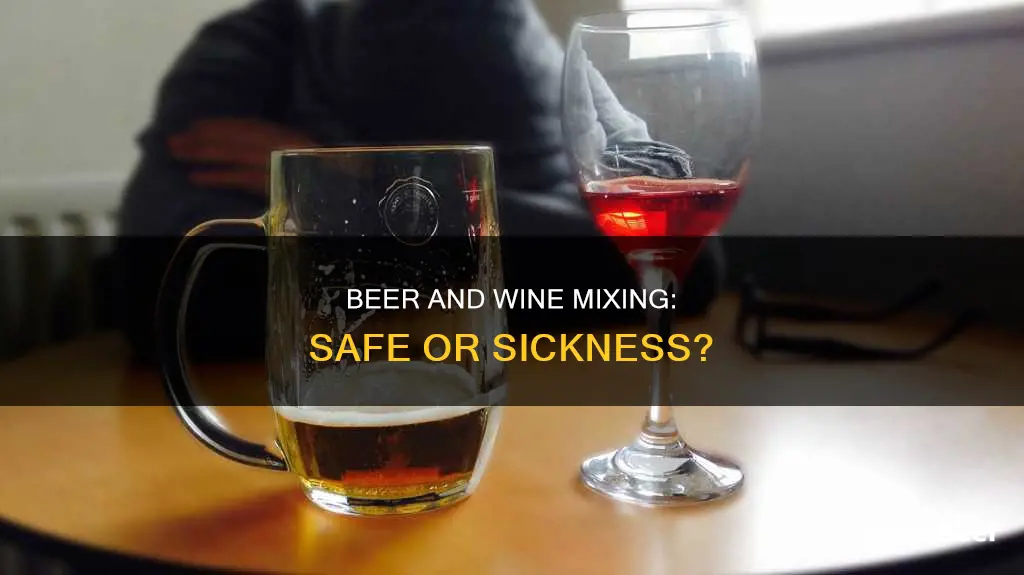
There is a popular saying that goes, beer before wine and you'll feel fine; wine before beer and you'll feel queer. But is there any truth to it? Many people swear by this rule, but does it have any scientific basis?
According to some theories, drinking wine after beer can make you sick because the carbonation in beer causes you to absorb the alcohol from wine more quickly and easily, leading to increased inebriation and a worse hangover. However, research has found no correlation between hangover symptoms and the order in which drinks are consumed.
So, while some people may have personal experiences to support this saying, the scientific evidence suggests that it is a myth. The amount of alcohol consumed and individual factors such as genetics, smoking, and drinking on an empty stomach are more likely to influence the severity of a hangover.
| Characteristics | Values |
|---|---|
| Will drinking beer after wine make you sick? | No |
| Why do people think drinking beer after wine makes you sick? | There are many theories, including the idea that carbonation in beer makes you absorb alcohol from wine more quickly, leading to worse hangovers. |
| What does the research say? | A study found no correlation between hangover symptoms and drinking beer and wine in either order. |
| What does affect hangover severity? | How drunk the subjects felt, whether they vomited, how much they drank, how frequently they drink, genetics, congeners, and smoking. |
What You'll Learn

Carbonation in beer may speed up alcohol absorption
Some studies show that carbonation in drinks like champagne speeds up the rate of alcohol absorption anywhere from 40-50%. However, it's important to note that the studies on this topic are limited. Additionally, the effects of carbonation on alcohol absorption vary from person to person. Other factors, such as existing medications, health conditions, smoking, and body composition, can also affect how quickly alcohol is absorbed and how it affects the body.
While carbonation may temporarily increase the rate of alcohol absorption, it does not make a person more drunk overall. Over time, the amount of alcohol consumed, rather than the presence of carbonation, determines how drunk a person becomes. Additionally, drinking in moderation is the best way to avoid a hangover, regardless of whether wine or beer is consumed first.
Beer and Stomach Infection: Is It Safe to Drink?
You may want to see also

The pyloric sphincter muscle and carbonation
The pyloric sphincter is a muscular valve at the bottom of the stomach that regulates the flow of food and drink from the stomach to the small intestine. It is usually closed, but it opens at regular intervals to allow food to pass through. The pylorus forms at the boundary between the stomach and the duodenum, which is the upper portion of the small intestine.
The pyloric sphincter is also known as the sphincter pylori, a thickening of the middle layer of stomach muscle around the pylorus. It holds food in the stomach until it is thoroughly mixed with gastric juices. When the pyloric sphincter opens, it allows food to pass into the duodenum. This process is called pyloric relaxation.
Carbonation can affect the pyloric sphincter. When you drink a fizzy drink, the bubbles form on the stomach lining, similar to how they form on the side and bottom of a glass. These bubbles stimulate the pyloric sphincter muscle and cause it to open, allowing food and drink into the intestine. The small intestine has a much higher surface area-to-volume ratio than the stomach, which allows for the increased absorption of nutrients and alcohol.
According to one theory, drinking wine followed by beer can lead to increased inebriation and a worse hangover. When you drink wine, it sits in your stomach and is slowly released into the intestine. If you then drink a carbonated beverage like beer, the bubbles can stimulate the pyloric sphincter to open, allowing the wine and beer to pass into the intestine together. This cocktail is rapidly absorbed, potentially leading to increased intoxication and a worse hangover.
However, a study published in Harvard Health Publishing found no correlation between hangover symptoms and the order of drinking beer and wine. The best predictors of a bad hangover were how drunk the subjects felt and whether they vomited after drinking.
Beer and Tylenol: Safe Mix or Health Risk?
You may want to see also

Alcohol is absorbed quickly, regardless of source
The popular saying goes, "beer before liquor, never been sicker; liquor before beer, you're in the clear". However, this is a myth. The short answer is no—the order in which you consume your drinks is unlikely to influence whether you experience a hangover the next day.
Alcohol is absorbed rather well and rather quickly, regardless of its source. It begins to be absorbed into your bloodstream as soon as it reaches your stomach. Thus, all the alcohol you drank the night before will have been absorbed well before your hangover takes effect.
Carbonated drinks like beer and sparkling wine can irritate the stomach lining, increasing alcohol absorption rates. However, this is not a good reason to believe that drinking liquor before beer will protect you from a hangover any more than drinking beer first. It's the amount of alcohol, not the order in which you drink, that matters.
Other factors that can affect your risk of experiencing a hangover include the amount of alcohol you drink, whether you ate before drinking, how frequently you drink, genetics, congeners, and smoking.
Beer and Prozac: Safe Mix or Risky Business?
You may want to see also

Total alcohol consumed matters more than order
There is a common belief that the order in which you consume alcoholic drinks can affect how sick you get. This is encapsulated in the sayings, "beer before wine and you'll feel fine" and "beer before liquor, never been sicker; liquor before beer, you're in the clear". However, scientific research has found that the total amount of alcohol consumed is a better predictor of a hangover than the order in which drinks are consumed.
The idea that drinking beer after wine or liquor will make you sick is just a myth. A study conducted on 90 adults aged 19-40 found no correlation between hangover symptoms and whether subjects drank only wine, only beer, or switched between them in either order. The best predictors of a bad hangover were how drunk the subjects felt and whether they vomited after drinking.
Alcohol is absorbed quite well and rather quickly, regardless of the source. The total amount of alcohol consumed and how fast it is absorbed are more relevant factors in determining the severity of a hangover. The belief that drinking beer after wine will make you sick may have originated from the fact that carbonated drinks like beer can irritate the stomach lining, increasing the rate of alcohol absorption. However, this does not mean that drinking beer after wine will necessarily make you sicker.
Other factors that can affect your risk of a hangover include the amount of alcohol you drink, whether you ate before drinking, how frequently you drink, genetics, congeners (compounds found in alcoholic beverages that can contribute to hangovers), and smoking.
Dialysis and Alcohol: Can You Drink Beer Safely?
You may want to see also

Other factors that affect hangovers
There are many factors that can influence the severity of a hangover. Firstly, the amount of alcohol consumed is a key factor, with higher consumption typically leading to worse hangovers. The type of alcohol can also play a role, as darker spirits like bourbon tend to have higher levels of congeners, which are compounds produced during fermentation that can worsen hangover symptoms. Sulfites, which are preservatives added to wine, can also cause headaches for people with sensitivities.
In addition to the type and amount of alcohol, other factors such as genetics, age, sex, and associated activities during drinking can influence hangover severity. For example, women tend to have higher blood alcohol concentrations than men when consuming the same amount of alcohol, making them more prone to hangovers. Acetaldehyde, a byproduct of alcohol metabolism, can also cause a condition called the "Asian Flush" in East Asians due to a specific genetic variant. This variant results in a higher buildup of acetaldehyde, leading to an uncomfortable reaction and more severe hangovers.
Other factors that can affect hangovers include sleep quality and duration, as alcohol disrupts sleep patterns and contributes to fatigue. Additionally, drinking can cause dehydration, gastrointestinal irritation, inflammation, and changes in hormone levels, all of which can contribute to the unpleasant symptoms of a hangover.
Beer and Homeopathy: Is It Safe to Mix?
You may want to see also
Frequently asked questions
No, it will not make you sick. It is a common misconception that the order in which you drink alcohol affects how sick you will feel. However, it is the amount of alcohol you consume that matters, not the order or type.
There are a few theories as to why this belief exists. One theory suggests that carbonated drinks like beer irritate the stomach lining, increasing alcohol absorption. Another theory suggests that people tend to drink less beer after liquor, whereas they tend to drink more liquor after beer, and so blame the last drink consumed for their sickness.
No, this saying is not based on scientific evidence. A study found no correlation between hangover symptoms and whether subjects drank only wine, only beer, or switched between them in either order.
No, there is no evidence to support this. However, it is important to note that drinking large amounts of alcohol in any order or type can have negative health effects.
To reduce the risk of a hangover, it is recommended to avoid drinking on an empty stomach, limit alcohol consumption, and drink water in between alcoholic drinks.







